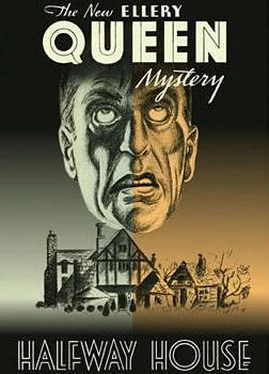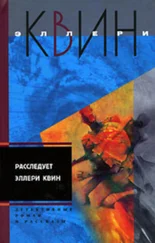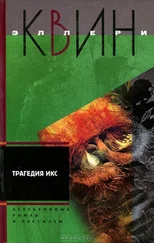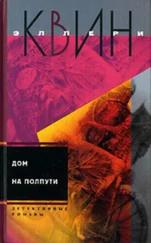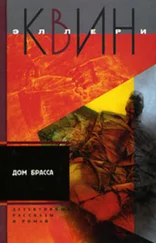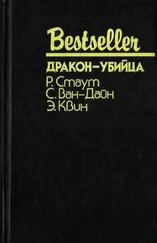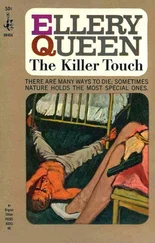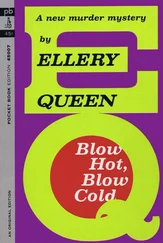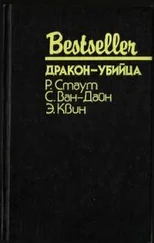Andrea was at the door now. She moved like a somnambulist, slowly, across the fawn rug toward the table, eyes fixed on the patch of rug behind it.
“Only the legs are visible,” said Ellery softly.
Andrea stopped by the table, looked at it, hesitated. Then Ellery sprang at her and his arm descended toward her head. Andrea drew in her breath.
“The criminal attacks Andrea from behind, knocks her unconscious. Andrea slips to the floor. The woman works swiftly. She sees now whom she has assaulted. It is necessary to leave a note of warning. She has no writing implements herself; she searches Andrea’s bag; none there. She searches the house; no pen or pencil. The pen on Gimball’s body has run dry. There is no ink in the desk-set. What to do?
“Then she sees the cork which came from the tip of the paper-knife, has an inspiration. She tears off a piece of wrapping-paper, goes to the table with the cork, takes the knife out of the dead man’s body, sticks the cork on its tip again, begins to char the cork with paper-matches. She chars, writes, chars, writes, dropping the burnt matches on the plate. Finally the note is finished — a warning to Andrea to say nothing whatever about what she has seen this night, or her mother’s life will be forfeit.”
“Andrea. Darling,” moaned Jessica feebly.
Ellery gestured with one hand. “The woman thrusts the note into Andrea’s limp hand. She drops the knife with the burnt cork on it on the table. She leaves, drives off in the Ford. Andrea comes to about nine. She reads the note, sees the body, recognizes her stepfather, thinks he is dead, screams, and flees. Then Bill Angell arrives, talks to the dying man. That,” said Ellery with a peculiar intonation, “is the script as it has been related to me.”
Again the dreaded silence fell. Then Senator Frueh said slowly, quite without anger or rancor, “What do you mean, Queen?”
“I mean,” said Ellery in a cold voice, “that a page of the script is missing. Something has been omitted. Andrea!”
She raised her eyes. There was something very strange in the air. She was wary, tense, sitting forward. “Yes?”
“What did you see when you came in here the second time, before you were struck on the head? What did you see on this table?”
She moistened her lips. “The lamp. The plate. With — with—”
“Yes?”
“With six match-stubs on it.”
“How interesting.” Ellery leaned toward them, his eyes narrow and completely dangerous. “Did you hear that? Six match-stubs. Well, let me go into this a little more scientifically. Andrea says that before she was struck, while the murderess was still here, she saw six half-burnt match-stubs on the plate. An obviously significant fact. It changes everything, doesn’t it?” There was such an odd quality in his tone that they searched one another’s faces for a confirmation of their own confused, timid, and terrible thought. His voice pulled them up again. “But this was before the cork was charred. Therefore those six matches had not been used for charring the cork, the deduction I made when I thought that all twenty matches had been ignited after the crime. No, no, six of them were used for a different purpose altogether. Well, if they weren’t employed in charring the cork, why were they struck?”
“Why?” asked Ella Amity swiftly. “Why?”
“Simple — so simple. Too simple! Why are matches struck, generally speaking? Well, for conflagration? But nothing was consumed by fire — there was no débris or ashes anywhere on the premises, inside or out, as I’ve once before explained; nor to char the cork, for the knife was still in the body when Andrea says she saw the six stubs. So conflagration is out.
“For light, to find a way in the dark? The light was on in here, and outside there were no footprints except Gimball’s. But Gimball would have needed no illumination outside; it was still daylight when he returned to get a knife in his chest. For heating? No ashes in the fireplace grate, and the broken-down old coal-stove is utterly useless. And there is no gas. For — improbably — torture? Logically, it is possible; this was a violent crime, and conceivably the victim might have been tortured to give information. But I once asked the coroner to discover if there were signs of burnt flesh on the victim. No, there were none. Then what the devil were those six matches used for?”
“It sounds screwy to me,” muttered Jones.
“It would be,” retorted Ellery, “if there weren’t still one more possible use. It’s the only one left. They were used for smoking.”
“Smoking!” Ella Amity’s lips parted. “But you said at the trial that they couldn’t have been used for smoking!”
Ellery’s eyes flickered. “I didn’t know then that Andrea had seen six matches before the cork was charred. Let’s leave that now. Andrea?”
“Yes?” Again the wariness, the stolidity, so alien to her.
Ellery snatched an envelope out of the discarded suitcase. He shook its contents onto the plate on the table. Half-burnt matchsticks poured out. They watched him, puzzled. He put all but six back in the envelope. “Come here, please.”
Andrea rose wearily, trudged toward him with stiff limbs. “Yes?” she said again.
“It works out so neatly, doesn’t it?” Ellery murmured with a trace of irony in his voice. “All right. You’re back here at eight thirty-five that night, at the table, about to be hit on the head. Here are the six matches on the plate.”
“Well?” Even her voice was tired, strangely old, as if in the midst of youth she had come to the end of the road.
“Look at this table, Andrea.” At the steel in his tone she seemed surprised out of her stolidity, for she took a backward step, looked down, looked up at the table. “The lamp. The plate with the six matches. Was that all?”
“All?”
“Wasn’t there something else? Think, Andrea! Think and look and tell the truth.” He added in a merciless voice: “I want the truth, Andrea, this time. ”
Something in the way he said it touched a live nerve somewhere in her; she glanced about at the intent, stupid faces wildly. “I—” And then the most incredible thing happened. Her glance returned to the table, to the plate with the matches. It remained there for an instant and slowly, as if impelled by a force against which resistance was futile, moved to a spot three inches beyond the plate. A bare spot; there was nothing there. But Andrea saw something there; her face said so, her eyes, the clenching of her hands, the quick breath. Knowledge flooded through her like liquid through a blotter; it was as plain to those who watched as the distress, the indecision, the agony on her face. “Oh,” she whispered. “Oh, dear—”
“ What lie ,” and Ellery’s voice cracked like a whip, “ are you going to tell me now, Andrea? ”
Her mother jumped up, stopped. Grosvenor Finch said something inarticulate. Senator Frueh was white. Burke Jones was gaping. Only the old man in the wheelchair sat unmoved, a corpse among living, fluttering beings.
“Lie—?” choked Andrea. “What do you mean? I was just going to tell you—”
“Another lie,” Ellery said with terrible softness. “Spare us the pain of listening. I know now, young woman. I’ve known for some time. Lies, all lies. Lies about the six matches. Lies about being struck over the head. Lies about the ‘warnings’ you received. Lies about everything! Shall I tell you why you lied? Shall I tell you what factor you represent in this bloody equation? Shall I tell you—?”
“Good merciful God,” said Andrea’s mother hoarsely. On the right half of old Jasper Borden’s blue lips there was a blind and groping protest. The others sat so still...
Читать дальше
